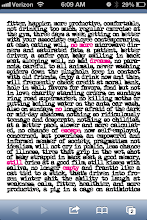Enough about Arabella! She's pretty tiresome anyways...and there is a reason for her character as a few have often pointed out in their blogs; she always has her head stuck in a book and uses them as a guide to live her life.
"For Heaven's sake, Cousin, how have you spent your time; and to what Studies have you devoted all your Hours, that you could find none to spare for the Perusal of Books from which all useful Knowledge may be drawn; which give us the most shining examples of Generosity, Courage, Virtue, and Love; which regulate our actions, form our Manners, and inspire us with a noble Desire of emulating those great, heroic, and virtuous Actions, which made those Persons so glorious in their Age, and so worthy imitation in ours? However, as it is never too late to improve, suffer me to recommend to you the reading of these Books, which will soon make you discover the Improprieties you have been guilty of; and will, probably, induce you to avoid them for the future" (48-49).
But the problem with this is that the books are not always such a good thing for Arabella because she takes them way too literally (which is why she is called the female quixote...). But this is only part of what is going on. Lennox is sharing more with the reader than just the story of some girl who takes books literally. At the beginning of each chapter, Lennox provides the reader with little epigraphs that tell the reader how they ought to read that chapter or respond to it. There are times that it seems more neutral to rebel against these prescribed readings and interpret it in your own way. Lennox seems to use these to prevent the very things that happen to Arabella because of her reading by showing a reader how they should read a text and what moralistic implications and real guides to life a reader should take from the novels instead for the grandiose ideas like Arabella's. This is similar to the way in which Richardson responded to Pamela, demanding one, and only one reading of it, suggesting that reading it in any way but its moral form was almost like desecrating the text. This really seems to reduce their function though because, as I mentioned before, sometimes the way Lennox suggests to read the chapter is not the way to read it at all, or at least not the way you're inclined to read it. So what is this saying about the text and about reading novels??? And what about the irony about writing a novel that is against novels???
On another note, this issue with novel readings is important, especially when it comes to "ruining" women. If one reads Pamela in the Shamela or Anti-Pamela way, one could argue that her decline in morals was due to her extensive reading of novels. Another way to look at it (from the scribbling women's perspective), she could have made up all of these stories in her letters based on the heroes and heroines she read about in her books. Book reading is mentioned a lot in Pamela, especially in the beginning. Either way, books can be blamed for her shortcomings and departure from her virtuous ways and her overactive imagination.
Soooooooooooo are novels the root of all evil??? It sure seems to be that way...
Monday, April 13, 2009
Subscribe to:
Post Comments (Atom)




Haha! I thought the SAME thing about Arabella taking her heroines too seriously (she even dresses like them for crying out loud) and uses the old romance works to guide her morals and behaviors. While reading her mother's old books may be a sort of salvation for her, as it gives her somewhere to escape to from her dreary house, I feel like it gives a veiled outlook much different from that of Evelina's. I feel like even though Evelina did not know as much about London society, she navigated through it better, but Arabella is stuck in a fairy tale world. Even her name makes it sound like she should be waiting in a tower for her true love to ride up on a white horse, even though she's no princess.
ReplyDelete